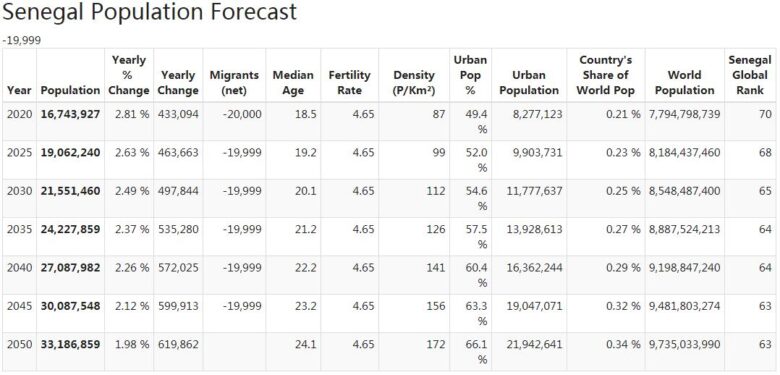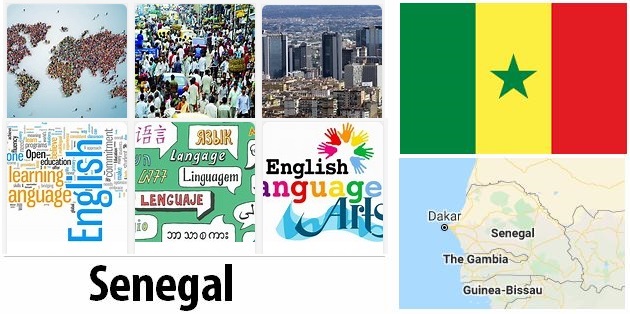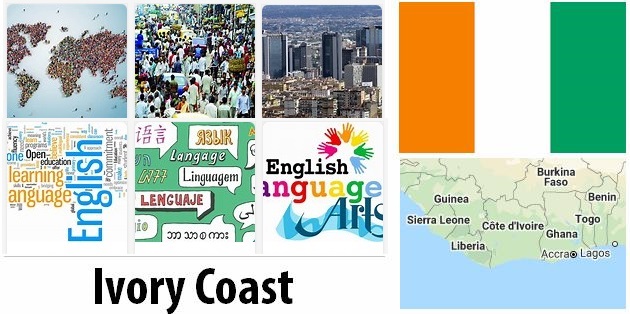Senegal Population and Language
In Senegal there are around 20 ethnic groups. Largest are wolof, which make up more than a third of the population and dominate linguistically and culturally. Nearly half of the residents live in cities. Many refugees from other countries in the region apply to Senegal, which is perceived as a politically stable country.
Nearly half of Senegal’s residents live in cities. Many move there from the poor countryside in the hope of finding work. Especially the capital city of Dakar suburbs is growing rapidly. Nearly a quarter of the population lives in the Dakar region, which occupies the Cap Vert peninsula and is one of the least affected regions in the country. Plans have been made to build a brand new capital to try to solve today’s problems with the overpopulated big city. Now you are investing in new satellite cities instead.
- COUNTRYAAH.COM: Key populations estimated size and data of Senegal, including population density of how many people per square mile. Also included are facts for population and language.
Six native languages have special status as national languages: wolof, fulani (or poular, also spoken by tukulor), serer, diola (jola), mandinka (mandingue) and soninke.
Wolof lives mainly in the western and central parts of the country, while the Serbian people are mainly southeast of Dakar. Tukulor and fulani are in the majority along the Senegal River in the north, and diola and mandinka dominate in the south. There are large groups of immigrants from neighboring Guinea and from the Cape Verde Islands. In the cities there are also tens of thousands of non-African residents, mainly French and Lebanese.
Many refugees from other countries in the region apply to Senegal, which is perceived as a politically stable country. Tens of thousands of black Mauritanians fled to Senegal in 1989 (see Foreign Policy and Defense). In collaboration with the UNHCR, the majority had returned to their home country in 2012, while just over 13,000 remained in Senegal.
Around 15,000 Senegalese over the years are estimated to have moved away from the fighting in the Casamance region (see Modern history) to The Gambia, Guinea-Bissau and Guinea. Casamance also has a large number of internally displaced people who, due to the unrest, were forced to leave their villages in the countryside. Estimates of how many they are vary between 10,000 and 40,000.
Senegal has also become an important transit country for refugee flows in the area. In 2006, it was noted that the country had become the shipping port for thousands of Africans who illegally applied to the Canary Islands, in an attempt to get to Europe. Many Senegalese were also included in the stream of people who in small boats and with life as effort went out to sea. Many died on the road and others were sent back. Since Senegal and Spain tightened their patrol of the sea area, fewer people have tried to get to Europe that way.
FACTS – POPULATION AND LANGUAGE
Population
wolof 38.5%, fulani and tukulor 27%, sera 15%, mandinka 5%, diola 4%, soninke 2.3% (official statistics)
Number of residents
15 850 567 (2017)
Number of residents per square kilometer
82 (2017)
Percentage of residents in the cities
46.7 percent (2017)
Nativity / birth
35.6 per 1000 residents (2016)
Mortality / mortality
5.9 per 1000 residents (2016)
POPULATION GROWTH
2.8 percent (2017)
fertility rate
4.8 number of births per woman (2016)
Percentage of women
50.9 percent (2017)
Life expectancy
67 years (2016)
Life expectancy for women
69 years (2016)
Life expectancy for men
65 years (2016)
Language
French is the official language 1
- wolof is the largest languagesources
2015
September
Trial of Habré
The trial against Habré in Dakar resumes. When the defendant refuses to attend, he is carried into the courtroom by masked security guards. Habré is reportedly refusing to speak to his new defense attorneys (see July 2015).
Chad’s current leader is accused
The special court that handles the trial of Habré (see Political system and December 2012) receives a report from victims of violence in Chad against the country’s current leader Idriss Déby. He is charged with, among other things, genocide, war crimes and torture.
August
Karim Wade’s appeal is dismissed
The Supreme Court rejects Karim Wade’s appeal of the prison sentence for corruption (see March 2015).
July
New investments are promised
President Sall visits schools, hospitals and sports facilities in Casamance. He promises new investments in, among other things, agriculture and better communications to other parts of the country.
Trial against Chad’s former dictator is being updated
The trial of Chad’s former dictator Habré begins. The indictment concerns crimes against humanity during Habré’s time in power (1982–1990). Habré does not recognize the validity of the court but is forced to appear in the courtroom. However, defense attorneys are absent and the judge appoints three new attorneys. The trial is being updated until September to give the new defenders time to get into the case.
May
Senegal is criticized for the verdict against Karim Wade
A group headed by the UN Commissioner for Human Rights criticizes Senegal for the verdict against Karim Wade. The group considers that the verdict is arbitrary and that the defendant should be awarded damages.
2100 Senegalese soldiers are sent to Yemen
Senegal announces sending 2,100 soldiers to Yemen to assist Saudi Arabia in its fight against the Huthirbels in the Arab country (see Yemen: Current Policy).
April
A British judge is appointed to lead the trial against Chad’s dictator
Burmese judge Gberdao Gustave Kam is appointed by the AU and Senegalese government to lead the trial against Chad’s ex-dictator Habré. Kam has previously worked at the War Criminal Tribunal for Rwanda.
March
President calls for protest
President Wade calls for protests against the verdict. PDS supporters gather outside Karim Wade’s residence in Dakar where they burn car tires and throw stones at the police.
Karim Wade is convicted of corruption
Karim Wade is sentenced to six years in prison and $ 230 million in fines for corruption. He is believed to have hidden money in tax havens such as Panama and the British Virgin Islands. Karim Wade denies the crime. He and his lawyers have boycotted parts of the trial they call a “political witch hunt”. He appeals to the Supreme Court.
Karim Wade is appointed PDS candidate
The opposition party PDS appoints Karim Wade as its candidate in the next presidential election.
January
The border with Guinea
The border with Guinea opens again after being closed since August. The authorities justify the opening of the border with the fact that Guinea has made great efforts to limit the spread of Ebola.




